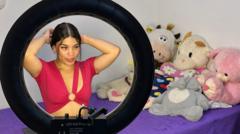The booming webcam modeling industry in Colombia has seen a disturbing trend of recruiting underage girls, luring them with promises of easy cash and a way to support their families. Many, like 20-year-old Isabella, found themselves working for sexcam studios after being approached in schools with leaflets proclaiming financial opportunities linked to their beauty.
Isabella, now 18, began her webcam career at the age of 17 while caring for her two-year-old son. The environment she entered was anything but professional—a modest house converted into a studio with various rooms masquerading as bedrooms, void of contracts and rights explanations. Once there, she was told to start streaming immediately, receiving no training or guidance. In desperation to provide for her child, she complied with unusual requests from viewers, even filming while locked in school toilets.
The reality of Colombia's webcam sector is stark. Reports suggest it has the highest number of models in the world—around 400,000—and over 12,000 studios. Predominantly featuring low-income individuals seeking financial relief, many performers lack the resources needed for privacy or internet access at home. Despite Colombian laws prohibiting the employment of models under 18, many studios employ deceptive practices, like using recycled accounts belonging to older models. Experiencing abuse and manipulation is not uncommon, with some performers coerced into uncomfortable actions for fear of account suspension.
Keiny, another young model from Medellín, reflects on her entry into the industry at just 17, motivated by her family's financial struggles. While she currently earns significantly more than the national minimum wage, she recognizes that many studios exploit their models, with some taking up to 80% of the streaming fees.
President Gustavo Petro has labeled these studio owners as "slave masters," highlighting their deceitful methods in recruiting young women and girls. The international streaming giants BongaCams, Chaturbate, and others have claimed to enforce age-check protocols; however, models indicate that these systems are inadequately monitored. Clara, a model in the industry, remarks that clients desiring 'young-looking' performers often blur ethical lines, fostering a troubling culture.
While some studios take a hands-on approach to supporting models' mental health, many do not, leaving performers at risk of exploitation and financial instability. Reports from human rights organizations support claims of serious mistreatment, with workers facing unfavorable conditions and constant pressure to perform lengthy sessions against their will.
Isabella's experience ended in emotional trauma, leading her to pursue psychological support, claiming that studios robbed her of expected earnings while leaving a permanent digital imprint of her underage performances. She, along with other former models, has initiated legal action against a studio for exploitation, hoping to shed light on this troubling industry and its practices. As the movement to regulate the webcam industry grows, advocates urge for stronger protections to prevent the exploitation of minors amidst a burgeoning financial landscape.




















